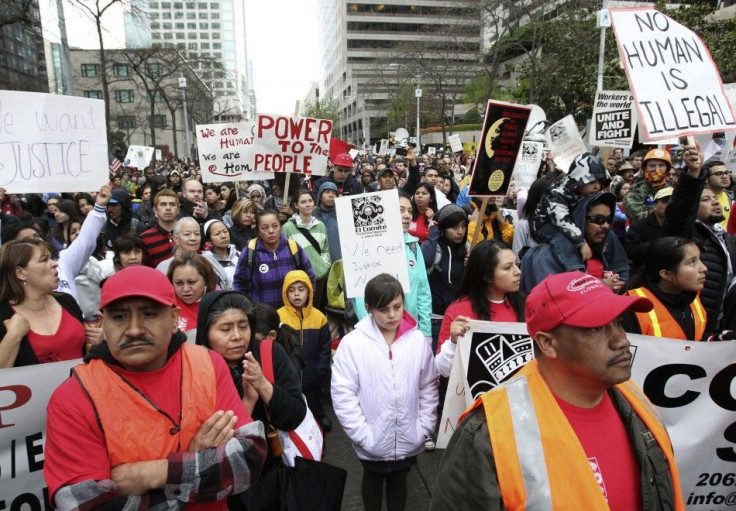Romney's Immigration Dodge: Walking A Tightrope, Candidate Stays Vague
ANALYSIS

Mitt Romney's current strategy on immigration could be described like this: attack the president, avoid details.
The presumptive Republican nominee is in a difficult place, caught between conservatives who would like to see immigration laws more strictly enforced and Hispanics who are wary of his position. The former are a substantial part of the Republican base and include the Tea-Party oriented voters who eluded Romney throughout the Republican presidential primary; the latter is a large and growing voting bloc that could determine the outcome in a handful of swing states.
During the primary, Romney girded himself against attacks on his right flank by positioning himself as an immigration hardliner. He took on Kris Kobach, the author of Arizona's controversial immigration law, as an informal adviser; denounced any measures to ease the lives of undocumented immigrants as amnesty (see Rick Perry's instantly-lambasted defense of a law offering undocumented students in-state tuition at Texas universities); and advocated a policy of self-deportation that is in line with the Arizona law's concept of attrition through enforcement.
But Romney has now shifted from a primary electorate flush with more conservative voters to a general election in which Latinos will wield substantial influence. And to get a sense of the conundrum he finds himself in, look no further than his response to the Supreme Court's ruling Monday on the Arizona law that Kobach, his counselor, crafted.
The court struck down some provisions of the law but upheld the most polarizing one, a measure requiring police officers to check the immigration status of people they believe to be in the country illegally. Romney's statement in response was purposefully noncommittal, faulting President Obama for failing to provide any leadership on immigration and hinting at states' rights.
This represents yet another broken promise by this President, the statement said. I believe that each state has the duty -- and the right -- to secure our borders and preserve the rule of law, particularly when the federal government has failed to meet its responsibilities.
When reporters pressed a Romney spokesman on the candidate's beliefs -- did he, in fact, support the Arizona law that he had lavished praise on during the primary? -- the response was equally vague. A reporter asked if Romney thought the ruling was wrongly decided, to which spokesman Rick Gorka replied, the governor supports the states' rights to do this. It's a 10th amendment issue.
But does the presumptive Republican nominee support the law? Arizona acted as a direct result of the failure of this president to address illegal immigration, Gorka answered. But does Romney specifically support the law? The question kept coming.
The governor supports the right of states, that's all we're going to say on this issue, Gorka said.
In its intentional obfuscation and repeated effort to deflect the questions back to an indictment of Obama, the exchange paralleled Romney's response to a new policy, unveiled recently by the Obama administration, under which many young undocumented immigrants would be shielded from the deportation and become eligible to get work permits.
Under repeated questioning, Romney refused to say whether he would repeal the order. Instead, he attacked Obama for pursuing a short-term fix rather than tackling comprehensive immigration reform, suggesting that the president's directive was a nakedly political maneuver.
During a highly anticipated speech last week to the National Association of Latino Elected and Appointed Officials, Romney fared little better. He offered some ideas about reforming worker visa programs, offering more green cards to immigrants who obtain advanced degrees (Obama has advocated the same) and fortifying the border with more agents (Obama has continued a buildup launched under President George W. Bush). But Romney again did not explicitly say how he would handle Obama's order shielding young immigrants from deportation.
The answer is that I will put in place my own long-term solution that will replace and supersede the president's temporary measure, Romney said. As president I won't settle for temporary measures.
That assumes that a President Romney could get comprehensive immigration reform past what could well be a divided Congress, not to mention the hardliners in his own party. President George W. Bush's attempt at an immigration bill collapsed in large part because Republicans turned against it.
Romney's unfaltering tactic throughout this campaign has been to criticize Obama, focus on the economy and avoid wading deeply into the policy nitty-gritty. But on immigration, after charging Obama with failing to lead, Romney has not offered much of an alternative.
© Copyright IBTimes 2025. All rights reserved.





















